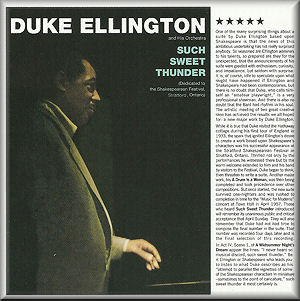1. Such Sweet Thunder
2. Sonnet for Caesar
3. Sonnet to Hank Cinq
4. Lady Mac
5. Sonnet in Search of a Moor
6. The Telecasters
7. Up and Down, Up and Down (I Will Lead Them Up and Down)
8. Sonnet for Sister Kate
9. The Star-Crossed Lovers
10. Madness in Great Ones
11. Half the Fun
12. Circle of Fourths
13. Suburban Beauty
14. A Flat Minor
15. Café au Lait
16. A Tone Parallel To Harlem (The Harlem Suite)
17. The Controversial Suite Part 1 (Before My Time)
18. The Controversial Suite Part 2 (Later)
Duke Ellington - Piano
Billy Strayhorn -Piano (tracks 16-18)
Russell Procope - Alto sax, clarinet
Johnny Hodges - Alto sax (tracks 1-15)
Willie Smith - Alto sax (tracks 16-18)
Jimmy Hamilton - Clarinet, tenor sax
Paul Gonsalves - Tenor sax
Harry Carney - Baritone sax, clarinet, bass clarinet
Clark Terry, Willie Cook - Trumpets
Cat Anderson - Trumpet (tracks 1-15)
Francis Williams - Trumpet (track 16)
Harold "Shorty" Baker - Trumpet (tracks 17, 18)
Ray Nance - Trumpet, violin, vocals
Quentin Jackson, Britt Woodman - Trombones
John Sanders - Trombone (tracks 1-15)
Juan Tizol - Trombone (tracks 16-18)
Jimmy Woode - Bass (tracks 1-15)
Wendell Marshall - Bass (tracks 16-18)
Sam Woodyard - Drums (tracks 1-15)
Louie Bellson - Drums (tracks 16-18)
Many critics have singled out the years between 1939 and 1942 as the peak of Duke Ellington's achievement. However, as Stanley Crouch pointed out, Ellington (and his co-composer, Billy Strayhorn) continued producing considerable compositions after that. Crouch specifies the years 1957-1967 as a remarkable decade, and 1957 produced Such Sweet Thunder, a work which might be called Ellington & Strayhorn's masterpiece, except that they wrote so many masterpieces!
I actually reviewed another version of this album in 2008 but there's no harm in revisiting such a remarkable recording. Ellington had been commissioned by the Stratford, Ontario Shakespeare Festival to write a piece related to Shakespeare and this was the result. Most of the tracks represent a Shakespearian character or situation. Perhaps the most remarkable are the four "sonnets" which, as a critic has pointed out, consist of 14 phrases of ten notes each, matching exactly the structure of Shakespeare's sonnets. The Sonnet for Caesar is rather gloomy, possibly foreshadowing Caesar's assassination. The Sonnet to Hank Cinq is more upbeat but has an ominous ending. The Sonnet in Search of a Moor showcases bassist Jimmy Woode, while the Sonnet for Sister Kate is a thoughtful piece which uses plunger-muted trumpet to express the sadness implicit in The Taming of the Shrew.
The suite opens with the sturdy title-track, driven along by Sam Woodyard's implacable rimshots. Lady Mac is a danceable waltz, introduced by Duke's twinkling piano and using Russell Procope's alto sax and Clark Terry's trumpet (flugelhorn?) to set a mood that is simultaneously joyful and ominous, with the ominous strand emphasised by the coda. The Telecasters has three trumpets (the three witches?) and the baritone sax (Iago?) pacing mysteriously.
Up and Down is one of the many highlights of the suite, with clarinets and violin dancing about like the fairies in Midsummer Night's Dream before Clark Terry and Ray Nance (on violin) - both puckish performers - represent Puck's mischievous pranks. And here we come to one of the worrying things about this release. The most memorable part of the track is when Clark Terry's trumpet ends by virtually speaking Puck's phrase "Lord, what fools these mortals be". Unfortunately this reissue uses a different take which omits this classic moment, even though the sleeve-notes refer to it twice!
The Star-Crossed Lovers originated as a Billy Strayhorn composition called Pretty Little Girl but it makes a perfect portrait of Romeo and Juliet, with Johnny Hodges' rapturous alto singing the glorious melody. Madness in Great Ones captures the effect of Hamlet's (feigned?) madness with disjointed instruments chattering before Cat Anderson's insanely stratospheric trumpet takes us into the higher realms of madness. Half the Fun evokes Cleopatra's winning charms with a touch of the exotic. The suite ends with Circle of Fourths, in which the four aspects of Shakespeare's writing (comedy, tragedy, history and the poems) are represented by tenorist Paul Gonsalves advancing through twelve keys, a fourth at a time.
The next three tracks are supposedly items from the same sessions, originally intended for inclusion in the suite but discarded. This reissue also includes another of Ellington's major works, A Tone Parallel to Harlem, which convincingly captures the atmosphere of Harlem in its many moods. And the two parts of The Controversial Suite illustrate Duke's tongue-in-cheek idea of jazz history - old and new.
Tony Augarde
www.augardebooks.co.uk
